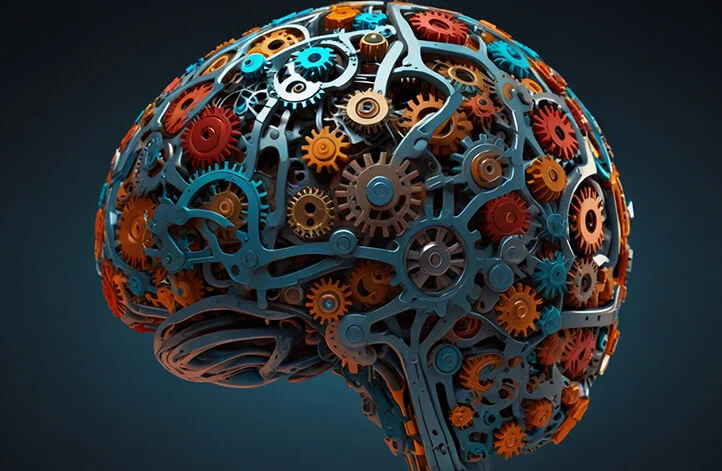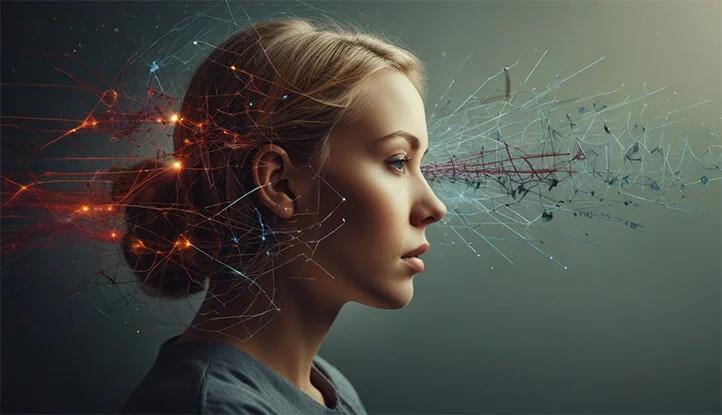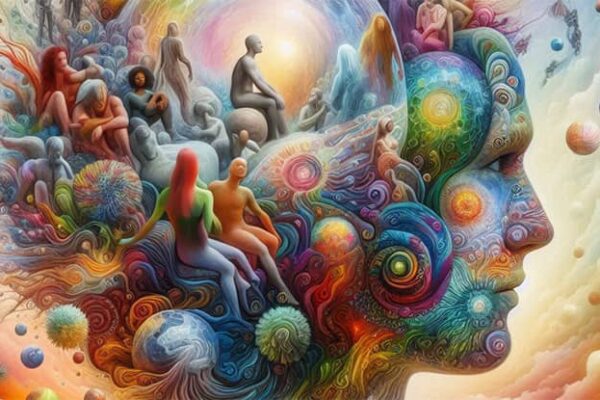In our digital world, overflowing with information and stimuli, we constantly make decisions and form judgments. However, these processes are not always entirely rational and objective. Every now and then, each of us makes systematic thinking errors known as cognitive biases.
Cognitive biases are a persistent tendency of the human brain toward logical errors, biases, and simplified thinking models. They affect all aspects of our lives—from everyday decision-making to complex professional and interpersonal situations.
Understanding the nature of cognitive biases and their influence on our thinking and behavior is crucial. They can lead to serious consequences, such as:
- making unfounded or even dangerous decisions;
- bias, intolerance, and conflicts;
- limited creative and critical thinking;
- inability to adapt to changes and new information.
Only by recognizing the presence of cognitive biases and working on correcting them can we become more rational, objective, and effective.

Common Types of Cognitive Biases
There are many different types of cognitive biases that affect our perception of reality, judgments, and behavior. While they share a common foundation in the limited rationality of human thinking, each specific bias manifests differently and can have far-reaching consequences. Knowing common types of cognitive biases is the first step toward overcoming their negative impact on our lives.
Some of the most significant cognitive biases are related to our beliefs and how we interpret information. Others affect how we perceive randomness, cause, and effect. Still others distort our views on values, risks, and benefits. Let’s explore the most common examples from each category to better understand their nature and the dangers they pose.
Confirmation Bias
Confirmation bias refers to the human tendency to ignore, reject, or distort information that contradicts our established beliefs, values, or ways of thinking. We tend to actively seek, interpret, and remember information in ways that confirm our existing beliefs or hypotheses. We may:
- Ignore or downplay the significance of evidence that contradicts our beliefs.
- Remember information that aligns with our views and forget what contradicts them.
- Uncritically accept arguments that confirm our opinions and be skeptical of any opposition.
Confirmation bias leads to greater entrenchment in one’s beliefs, regardless of new contradictory information. This cognitive bias can cause strong psychological resistance to new ideas and data, especially if they evoke emotional discomfort or threaten our self-esteem.
The tendency to confirm one’s point of view hampers the ability to learn and change based on new evidence and realistic feedback. It makes people stubborn and closed off, even in the face of undeniable evidence to the contrary.
Survivorship Bias
Survivorship bias occurs when we focus on people or situations that have succeeded while ignoring those that have failed. For example, when studying wealthy entrepreneurs, we might overlook the many other businesspeople whose companies went bankrupt.
Focusing only on the “survivors” leads to systematic skew and incomplete data sampling. This gives a distorted view of what factors truly contributed to success or failure.
Halo Effect
The halo effect describes a situation where an overall positive impression of a person or object influences the assessment of their specific qualities or traits. For instance, if someone appears attractive or possesses a noticeable positive trait, we tend to attribute (often unjustifiably) other positive qualities to them, such as intelligence or reliability.
The reverse is the “horns effect” or “devil effect,” where an overall negative impression causes us to ignore or downplay a person’s positive qualities.
The halo effect can lead to biased judgments about people based on superficial impressions rather than an objective assessment of their actual abilities and personal traits.
Hindsight Bias
Hindsight bias refers to people’s tendency to view past events as being more predictable than they actually were. After something has happened, it seems as though we “always knew it” and that the future was obvious, even though things were much less certain at the time.
This cognitive error leads to systematic distortion of memories and perception of the past. It also makes people overly critical of those who failed to foresee what now seems obvious in hindsight.
Hindsight bias hinders learning from past experiences and adequately preparing for an uncertain future. It creates an illusion of predictability and reduces the ability to accurately assess risks.
Overconfidence
Overconfidence occurs when people overestimate their abilities, knowledge, or beliefs. They are overly confident in their correctness, even when objective data doesn’t support it.
This cognitive error may stem from other biases, such as hindsight bias, self-serving bias, or the illusion of control (a false sense of influence over uncontrollable events).
Overconfidence impairs people’s recognition of their limitations and weaknesses, making it difficult for them to learn and improve. It can also lead to taking risky or poorly thought-out decisions.
Endowment Effect
The endowment effect refers to people’s tendency to irrationally overvalue what they already own compared to potential alternatives. This bias often hinders rational negotiation and decision-making.
For example, if you’ve owned an apartment for a while, you’re likely to overestimate its real market value simply because you’ve had it for so long. Another example is people refusing to sell stocks that have lost value because they overestimate their initial financial investment.
The endowment effect causes people to cling excessively to their current situation or possessions, even when other options are more favorable. It hinders rational decision-making in business, investments, and everyday life.
Status Quo Bias
Status quo bias is the tendency for people to keep things as they are, even though changes might improve the situation. We often feel more comfortable with the current state of affairs, even if it’s suboptimal.
For example, people may continue using an inefficient product or service simply out of habit, rather than because the alternatives are worse. Or employees might stick to outdated work methods because adopting new processes seems too troublesome.
This cognitive bias is partly explained by people’s reluctance to leave their comfort zone and fear of the unknown. However, it inhibits progress, innovation, and optimization in many areas of life.
Availability Heuristic
The availability heuristic describes people’s tendency to assess the likelihood of events based on how easily they can recall similar examples. The more memorable the examples, the more likely the event seems.
For example, due to extensive media coverage of violent crimes, many people overestimate the likelihood of becoming a victim of terrorism because corresponding cases are easy to recall. On the other hand, less dramatic but more common risks, like obesity or smoking, seem less dangerous.
The availability heuristic misleads because vivid and emotionally charged examples are remembered better than ordinary events. This can distort risk perception and lead to irrational decisions.
Illusion of Control
The illusion of control refers to people’s tendency to overestimate their influence or control over events that are largely determined by external factors or randomness. This cognitive bias is especially common in situations requiring certain skills or involving an element of luck.
For example, many gamblers experience an illusion of control, believing they can use a personal “system” or strategy to tilt the odds in their favor. Similarly, some stock market traders believe that their expertise and knowledge give them more control over stock prices than is possible in practice.
The illusion of control makes people overconfident in their ability to influence outcomes and often leads to excessive risk-taking. It also hinders individuals from taking responsibility for failures, as they believe everything was under their control. Correcting this cognitive bias is vital for more realistic risk assessment, awareness of limitations, and personal responsibility.

The Influence of Cognitive Biases on Our Lives
Cognitive biases are much more than mere intellectual curiosities or abstract concepts. They deeply penetrate various aspects of human experience, exerting real influence on our daily lives, decision-making, and relationships with others. Ignoring their impact means exposing ourselves to unnecessary risks and missing opportunities for personal growth.
From careers and finances to health and interpersonal relationships, cognitive biases form systematic barriers to optimal functioning. They lead to poor decisions, create obstacles to creativity and innovation, and generate conflicts and prejudices.
Moreover, some biases may even push individuals toward dangerous or self-destructive behavior. Understanding the scale and diversity of cognitive biases is the key to building a rational, objective, and harmonious lifestyle.
Decision-Making
One of the most serious areas affected by cognitive biases is decision-making. From everyday household choices to critical career, financial, and medical judgments, cognitive biases can lead to unjustified, irrational, or even dangerous decisions.
For example, the halo effect may cause unwarranted trust in a particular financial advisor, investment, or product due to a positive first impression. Confirmation bias encourages people to ignore critical information that contradicts their initial hypothesis or preference.
Cognitive biases make it difficult to fairly assess all relevant facts and risks. They push for hasty and poorly thought-out decisions, especially in complex situations of uncertainty.
Prejudices and Conflicts
Many cognitive biases contribute to the development of prejudices, intolerance, and conflicts. The tendency to judge people based on superficial impressions rather than objective facts is exacerbated by biases such as the halo effect and survivorship bias.
Confirmation bias and self-serving bias intensify polarization of views, causing people to stubbornly defend their point of view and ignore differing opinions. This makes it difficult to reach compromises and exacerbates conflicts.
At a broader societal level, biases fueled by cognitive distortions can lead to systematic discrimination, intolerance, and social conflict. Stereotypes and generalizations based on incomplete or distorted information hinder understanding and respect for other people, cultures, and groups.
Limitation of Creative Thinking
Cognitive biases pose a serious threat to creative and critical thinking. Clinging to existing beliefs makes it difficult to open the mind to new perspectives, ideas, and unconventional solutions.
Confirmation bias hinders the perception of information that contradicts the current hypothesis, limiting the search for alternatives. And the status quo bias encourages people to uncritically adhere to previous methods, even when more efficient ways are available.
Cognitive biases can also reduce innovative potential. For example, overconfidence makes it difficult to acknowledge weaknesses and shortcomings, while availability heuristics focus attention only on obvious examples, stifling creativity.
Overcoming the limitations created by cognitive biases allows us to unlock our full innovative potential, view problems from different angles, and generate more creative solutions.
Inclination Towards Risky Behavior
Some cognitive biases can unintentionally contribute to excessive risk-taking and risky behavior. These include:
- hindsight bias,
- overconfidence,
- illusion of control,
- the endowment effect.
These cognitive errors lead to an underestimation of risks and excessive confidence in favorable outcomes. For example, many financial crises and speculative bubbles are partly explained by the dominance of overconfidence among investors and entrepreneurs.
The tendency towards risky behavior due to cognitive biases can also lead to undesirable outcomes in health and safety contexts, including dangerous habits or neglecting precautionary measures.
Barriers to Personal Growth
Cognitive biases can significantly hinder personal development and self-improvement. They create systematic barriers to learning, changing beliefs, and improving behavior, as well as contribute to denial and ignoring constructive feedback and data on our shortcomings. For example, overconfidence makes it difficult to recognize personal limitations.
As a result, people get stuck in patterns of maladaptive thinking and behavior instead of learning, growing, and thriving. Only by recognizing and overcoming these cognitive biases can we realistically assess our strengths and weaknesses and use this experience for self-improvement.

How to Combat Cognitive Biases?
Although cognitive biases are an integral part of human nature, deeply rooted tendencies of our thinking, we are not doomed to be their eternal slaves. Recognizing how these systematic errors affect our judgments and behavior allows us to effectively counteract their negative consequences.
The path to overcoming cognitive biases begins with increasing awareness and developing critical thinking skills. However, it doesn’t end there. A multifaceted approach is needed, including striving for objective data, openness to new perspectives, and constant vigilance against potential thinking distortions. The reward for these efforts will be more rational decisions, stronger relationships, personal growth, and the ability to view the world more clearly.
Raising Awareness
The first and most crucial step to overcoming cognitive biases is to recognize their existence and understand how they affect our thinking. Self-awareness plays a key role, enabling us to see when we are making systematic reasoning mistakes.
Familiarize yourself with the different types of cognitive biases, their signs, and their consequences. Learn to recognize warning signs such as:
- devaluing differing opinions or information,
- oversimplifying complex situations,
- making superficial generalizations and categorizations,
- justifying or stubbornly defending a position.
By raising awareness of cognitive biases, we can better control their influence on our daily lives.
Practicing Critical Thinking
One of the most powerful strategies for overcoming cognitive biases is developing critical thinking. This includes the following aspects:
- Actively seeking different points of view and alternative hypotheses.
- Carefully assessing the reliability of sources and the objectivity of supporting information.
- Asking questions and testing assumptions.
- Considering counterarguments and possible flaws in reasoning.
- Drawing conclusions after weighing all the facts.
By critically analyzing situations from all angles, we reduce the impact of individual cognitive biases and enhance the soundness of our decisions.
Seeking Objective Data and Expert Opinions
To overcome the inevitable biases of human thinking, it is important to rely on objective factual data and expert opinions from unbiased specialists. Learn to trust such authoritative sources and rational methods, such as:
- Representative statistical data from reliable sources.
- Systematic reviews and meta-analyses of relevant literature.
- Qualified expert opinions free from obvious biases.
While intuition is important, one should avoid becoming entirely dependent on personal assumptions or unsubstantiated conclusions. Instead, rely on verified factual data and authoritative scientific opinions whenever possible.
Of course, even experts and data can be subject to systematic errors and cognitive biases. Therefore, it is essential to critically evaluate sources of information for potential biases and conflicts of interest. A healthy skepticism will help you identify blind spots.
Breaking Free from the “Filter Bubble”
One of the most destructive aspects of cognitive biases is the tendency of people to surround themselves with information that confirms their existing beliefs, creating a so-called “filter bubble.” But this can be overcome by stepping out of your comfort zone and exploring different perspectives.
The sources you interact with (media, books, social circles, etc.) should be as diverse as possible. Try to consume content that reflects a wide range of ideologies, cultures, and viewpoints, even if you disagree with them.
Engage with people with different views, experiences, and lifestyles. Listen to their stories and try to see the world through their eyes. Travel, get to know new cultures and traditions personally.
By stepping out of the intellectual and social “bubble,” you can enrich your worldview, develop greater objectivity, and become less susceptible to cognitive biases. It requires conscious effort, but the result is worth it.
Practicing Intellectual Humility
Intellectual humility, the recognition of the limitations of one’s knowledge and the willingness to change beliefs in the face of new evidence, is a powerful force against cognitive biases.
People with high levels of intellectual arrogance tend to cling to their current views, ignore counterarguments, and underestimate uncertainty. In contrast, intellectually humble individuals understand that their knowledge is imperfect and seek to fill mental gaps.
By fostering intellectual humility, we open our minds to new ideas and are willing to acknowledge past mistakes. This allows better adaptation to changing circumstances and combats cognitive biases such as the status quo bias or the endowment effect.
Regularly remind yourself of the limitations of your knowledge and actively seek opportunities to learn and adjust your views. In the long run, this will lead to more realistic, flexible, and well-reasoned thinking.
Vigilance in the Face of Cognitive Biases
Despite all efforts to overcome cognitive biases, they will never completely disappear from our thinking. Therefore, we need to strive to recognize them and apply appropriate coping strategies during moments of greatest risk.
For example, before making an important decision with strong emotions or high stakes, pause and think about which cognitive biases might be affecting your thinking:
- Overconfidence in success?
- Confirmation bias, ignoring important risks?
- Negative influence of accessible and emotional examples?
After identifying potential biases, apply appropriate countermeasures—seeking objective data, considering alternatives, involving external evaluations, etc.
This practice helps maintain vigilance and avoid falling into cognitive errors in key moments. Over time, it will become a habit, making you more rational and flexible in decision-making.

Conclusion
Cognitive biases permeate all aspects of human thinking, from everyday situations to philosophical questions. They can have serious consequences, including poor decision making, conflict, creative blockages, and even life-threatening situations.
However, by recognizing the existence of cognitive biases and working to overcome them through strategies such as awareness-raising, critical thinking, and seeking out objective data, we can significantly mitigate their negative impact.
By developing knowledge about cognitive biases, we gain a huge advantage – the ability to recognize systematic errors in thinking and consciously choose more rational paths. By perceiving the world around us with less bias, we achieve greater understanding of ourselves and others.
Combatting cognitive biases is crucial not only for ourselves, but also for the progress and development of society. Only by freeing ourselves from the shackles of ingrained prejudices and misconceptions can we unleash the full potential of the human mind and achieve true prosperity.




